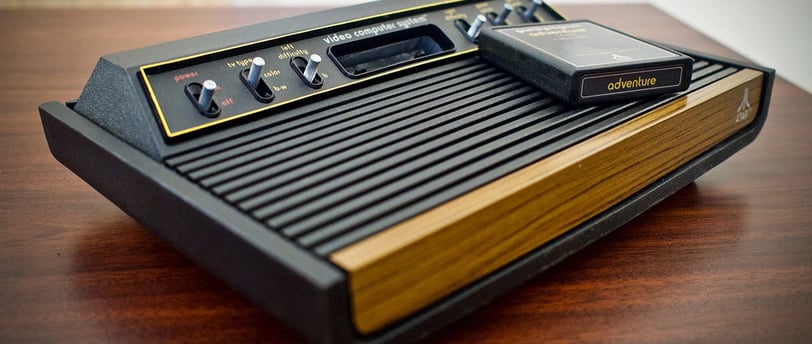The Rise, Fall, and Buried Legacy of Atari: A Gaming Revolution Story 🎮
Oh boy, grab your quarters and dust off those joysticks, because we're about to deep-dive into one of the most mind-blowing stories in tech history! Ever wonder how video games went from literally nothing to being a $200+ billion industry? Well, buckle up, because it all started with a company named after a Japanese board game term. (Yes, really!)
Nick Baldwin
5/8/20243 min read


The Birth of a Gaming Giant 🚀
Picture this: It's 1972, and two tech rebels named Nolan Bushnell and Ted Dabney are about to change entertainment forever. According to "The Ultimate History of Video Games" by Steven L. Kent, they originally wanted to call their company Syzygy (I know, try saying that five times fast!), but it was already taken. So they landed on "Atari" - a term from the ancient game Go meaning "you're about to win." Talk about manifesting your destiny!
Their first hit? A game so simple it makes modern mobile games look like rocket science. Pong wasn't just a game - it was a cultural earthquake that shook the foundations of entertainment. Fun fact: The prototype, installed in Andy Capp's Tavern in Sunnyvale, California, was so popular it literally broke because people stuffed it with too many quarters! (Source: "Atari Inc.: Business is Fun" by Marty Goldberg)
The Golden Age Begins ✨
By 1976, these gaming wizards had struck gold - or should I say silicon? Warner Communications snatched up Atari for a whopping $28 million (that's about $140 million in today's money - not too shabby for a company that started in a garage!). But hold onto your power-ups, because the best was yet to come.
In 1977, they dropped the Atari 2600, and holy pixels, did it change everything! Before this magic box, each game needed its own dedicated hardware - imagine buying a whole new phone just to try a new app! The 2600's swappable cartridges blew people's minds. Games like Space Invaders became such phenomena that they literally caused a coin shortage in Japan. No joke - there's documented evidence in "The First Quarter: A 25-Year History of Video Games" by Steven L. Kent!
The Empire at Its Peak 👑
Let me throw some numbers at you: By 1982, Atari was pulling in $2 billion annually and contributing 70% of Warner's operating profits. They weren't just successful; they were literally printing money faster than the U.S. Treasury! Their market share? A mind-boggling 80% of the home console market. Nintendo who?
But you know what they say about pride coming before a fall...
The Great Crash of '83 💥
Remember that friend who got too cocky playing Mario Kart and drove straight off Rainbow Road? That was basically Atari in the early '80s. The market became flooded with rushed games (quality control? What's that?), and then came... E.T.
Oh boy, E.T. This game wasn't just bad - it was legendarily bad. They spent $21 million on the license alone and gave their developers just five weeks to make the game. The result? So catastrophic that Atari literally buried millions of cartridges in a New Mexico landfill. This wasn't just an urban legend - in 2014, they actually dug them up! (Source: "Game Over: Press Start to Continue" by David Sheff)
The Legacy Lives On 🌟
Today, Atari is more of a brand than a gaming powerhouse. They've dabbled in everything from mobile games to NFTs (because why not jump on every bandwagon?). But here's the thing that makes this story so incredible: Without Atari's pioneering spirit, we wouldn't have the $200 billion gaming industry we have today. They weren't just making games; they were creating an entirely new form of entertainment.
As gaming historian Leonard Herman notes in "Phoenix: The Fall & Rise of Video Games," Atari didn't just create a market - they created a culture. Every time you pick up a controller or tap on a mobile game, you're touching a piece of their legacy.
The Modern Echo 🎮
Fast forward to today, and while Atari might not be dominating the gaming charts, their influence is everywhere. From the way games are marketed to how controllers are designed, their DNA is in every pixel of modern gaming. They proved that games could be more than just toys - they could be art, business, and cultural touchstones all at once.
So next time you're racking up high scores or exploring virtual worlds, pour one out for the OG gaming pioneers. They may have crashed and burned, but without their crazy dreams and wild ambitions, we might all still be playing Pong!
Game over? More like Game On! 🕹️
What's your favorite Atari memory? Did you ever own a 2600? Drop your gaming war stories in the comments - I'm dying to hear them! And hey, if you've got any dusty old cartridges in your attic, maybe check if they're worth something before burying them in the desert! 😉

Gaming
Exploring the origins of retro video games.
pixelspast79@gmail.com
© 2024. All rights reserved.